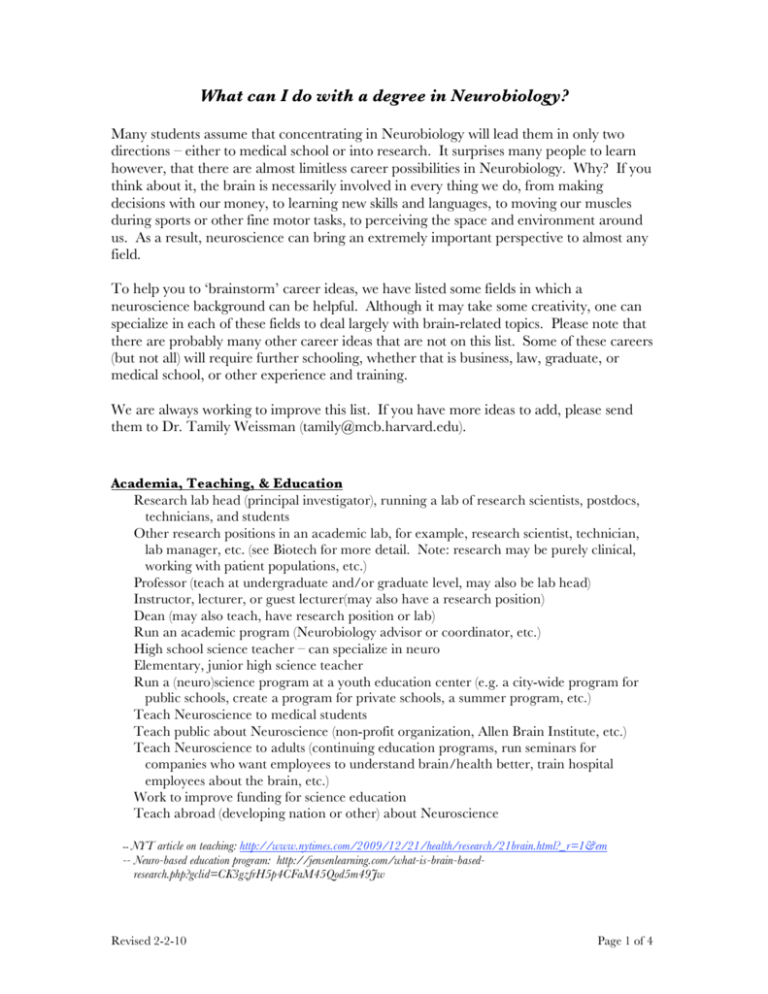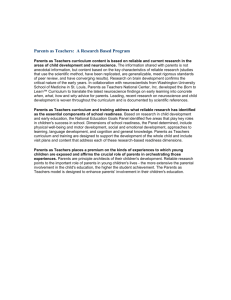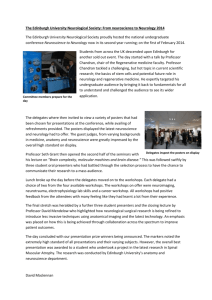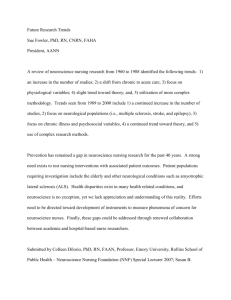What Can I Do With a Degree in Neurobiology (Harvard)
advertisement

What can I do with a degree in Neurobiology? Many students assume that concentrating in Neurobiology will lead them in only two directions – either to medical school or into research. It surprises many people to learn however, that there are almost limitless career possibilities in Neurobiology. Why? If you think about it, the brain is necessarily involved in every thing we do, from making decisions with our money, to learning new skills and languages, to moving our muscles during sports or other fine motor tasks, to perceiving the space and environment around us. As a result, neuroscience can bring an extremely important perspective to almost any field. To help you to ‘brainstorm’ career ideas, we have listed some fields in which a neuroscience background can be helpful. Although it may take some creativity, one can specialize in each of these fields to deal largely with brain-related topics. Please note that there are probably many other career ideas that are not on this list. Some of these careers (but not all) will require further schooling, whether that is business, law, graduate, or medical school, or other experience and training. We are always working to improve this list. If you have more ideas to add, please send them to Dr. Tamily Weissman (tamily@mcb.harvard.edu). Academia, Teaching, & Education Research lab head (principal investigator), running a lab of research scientists, postdocs, technicians, and students Other research positions in an academic lab, for example, research scientist, technician, lab manager, etc. (see Biotech for more detail. Note: research may be purely clinical, working with patient populations, etc.) Professor (teach at undergraduate and/or graduate level, may also be lab head) Instructor, lecturer, or guest lecturer(may also have a research position) Dean (may also teach, have research position or lab) Run an academic program (Neurobiology advisor or coordinator, etc.) High school science teacher – can specialize in neuro Elementary, junior high science teacher Run a (neuro)science program at a youth education center (e.g. a city-wide program for public schools, create a program for private schools, a summer program, etc.) Teach Neuroscience to medical students Teach public about Neuroscience (non-profit organization, Allen Brain Institute, etc.) Teach Neuroscience to adults (continuing education programs, run seminars for companies who want employees to understand brain/health better, train hospital employees about the brain, etc.) Work to improve funding for science education Teach abroad (developing nation or other) about Neuroscience -- NYT article on teaching: http://www.nytimes.com/2009/12/21/health/research/21brain.html?_r=1&em -- Neuro-based education program: http://jensenlearning.com/what-is-brain-basedresearch.php?gclid=CK3gzfrH5p4CFaM45Qod5m49Jw Revised 2-2-10 Page 1 of 4 Health-Related Careers Clinical psychologist (could specialize in behavioral neuroscience) Physician (M.D. or D.O.) Optometrist Nurse (for example, in neurology ward, neuro-oncology, pediatric neurology, etc.) Nurse practitioner or physician’s assistant (can specialize in neuro-related) Speech & language therapist (especially important for neurological patients with damage to left hemisphere, or children with neurodevelopmental disorders) Occupational therapist for adults (especially important following stroke, loss of basic function to take care of ones self, etc.) Occupational therapist for children (teaching how to compensate/alleviate developmental disorders, e.g. SPD, autism, ADD, motor disorders, etc.) Physical therapist (especially important following stroke, when working to regain function, etc.) Audiologist (assess hearing function in babies, children, or adults) Nutritionist (Your neuro background gives you a unique perspective on how nutrients and metabolism affect the nervous system. In your practice, you could specialize in neurological function.) Social worker (Your background would help you to understand the specific issues affecting neurological patients upon re-entering their environment following hospitalization.) Clinical researcher – could work at a number of levels, from technician to research scientist, etc. Pharmacist (Specialize in how drugs mimic neurotransmitters in the brain.) MRI technician Technician for other neurological procedures, e.g. deep brain stimulation Radiation physicist (this is someone who calculates precisely how radiation should be used to target tumors, for example tumors within the brain) Administrator or coordinator (for example, of a neurology ward or team of neurology residents and attending physicians) Run a public service project in an underserved area with limited medical care Which specialty? Here are some neuro-related health specialties (whether for doctor, nurse, or other). You may not have considered all of these: Neurology, neurosurgery, neuro-oncology, pediatric neurology, neuropathology, neurodegenerative disease (AD, PD), neuroradiology, neuromuscular function, sleep medicine, pain medicine, anesthesiology, earnose-throat,, rehabilitation medicine, movement disorders, ophthalmology, epilepsy, behavioral neuroscience, psychiatry, psychology, etc.) Global Health Run a clinical research project in another country (or work for one) Run a public service project in a developing nation (or work for one) Work for the Centers for Disease Control (CDC) – specialize in neurological disease Global health reporting and/or data collection – focus on neurological health Many other options here (e.g. UN, NGOs, MSF, OXFAM, USAID, World Bank) Revised 2-2-10 Page 2 of 4 Biotech industry Research scientist – do the actual experiments (Note: research may be basic science or purely clinical, working with patient populations, etc.) Research director (direct the bench scientists) Technician in biotech lab (could do biological, chemical, computational work, or even animal husbandry, brain dissections, etc.) Laboratory manager (run day-to-day lab operations) Executive (e.g. manager, department director, research facilities director) Press/Media writer, 'New Drug Application' writer Public relations – spokesperson to public, media, etc Human resources Patient coordinator Fundraising (Understanding the science can help to make fundraisers more effective.) Here is a list of biotech companies that specialize in Neuroscience (also see Merck, not listed here): http://www.zoominfo.com/Industries/biotech/biotechnology/neuroscience.htm Business & Law Neuroeconomist or economics consultant Chief-Scientific-Officer (CSO), Executive Director or other high-level at private company, non-profit foundation, government institution, or academic program Marketing or advertising consultant (What is going on in the brain when someone picks the red toothpaste over the blue toothpaste? How do we design the launch of a new drug?) Equity consultant, analyst or broker for an equity firm, venture capitalist or hedge fund (Is a biotech or pharmaceutical company a good investment?) Spokesperson for a neuro company – for example, educate public on the research that is going on at Michael J. Fox Foundation Patent lawyer (for example, draft a patent application to secure intellectual property rights for a neurobiological technique or product developed at Harvard) Lawyer (e.g. specialize in neurodegenerative disease cases, or child developmental problems) See all options under “Biotech industry” Consultant (they look for people with science background) – see “Consulting” Design & sell neuro-related products (for example, see: http://www.rapidlearningcenter.com/biology/neuroscience/neuroscience.html http://jensenlearning.com/what-is-brain-based-research.php?gclid=CK3gzfrH5p4CFaM45Qod5m49Jw http://www.harvardapparatus.com/webapp/wcs/stores/servlet/haicat1_10001_11051_37714_-1_HAI_Categories_N) Government & policy Work for a governmental office (Centers for Disease control, National Institutes of Health, Federal Drug Administration, etc.) that oversees public policy toward neurological disease, the aging brain, etc. Capitol Hill Staffer (work in congressional office, science/health-related initiatives) Congressional advisor (advise on policy for the care of children with neurodevelopmental diseases, intellectual disability, autism, epilepsy, etc.) Advise on policy for the care of persons with psychiatric problems, etc. Work at the National Institutes for Health (oversees funding for all science in the US) Grants administrator and/or reviewer (Program manager – NSF, NIH) NIH Program Director (e.g. http://www.ninds.nih.gov/find_people/ninds/bio_david_owens.htm) Global Health Organizations (see above) Revised 2-2-10 Page 3 of 4 Writing & Publishing Scientific journal editor (for example, Neuron, Cell, Nature, Science, Nature Neurosci, J. Neurosci, J. Neurobiology, J. Neurophysiology, Trends in Neurosciences, etc. etc. etc.) Scientific journalist (correspondent or columnist) Creative writing about the brain – for kids or adults Write biographies for famous neuroscientists Web design and writing for the NIH or other neuroscience organization Science education blogger (for example at Nature: http://www.nature.com/scitable) Science publishing (writing, editing, recruitment of writers) Produce science education material web/print (Scholastic, Nature Educ, Pearson Publshg) Consulting (advise people with your neuro background) Management consulting (specialize in science: biotech, pharma, healthcare) Private consulting firm Lobbyist (for foundations, biotech industry) Library (medical or other) Non-profit research or Foundation (e.g. Michael J. Fox Foundation) See all items under “Biotech industry” – those also apply here Grants specialist Discovery specialist for a research foundation (coordinate academic and biotech research to cure a specific disease) Creative sector Graphic designer for any company/orgzn/website on this list – they need people who know what the brain looks like! Design web-based scientific education material (NIH, Scitable, University Science Ctrs) Start-up company in anything neuro-related (e.g. things on this list) Science consultant for the media (e.g. a TV station – or Google?) Artist who specializes in how the brain perceives space, color, texture, emotion, etc. Architect who specializes in the brain’s perception of space, etc. Creative writing about the brain – for kids or adults Toy designer (use your knowledge of developing brains to shape toy products) Musician/instructor (understanding hearing & brain enriches composition, performance) Write neurosci-fi screenplays Web design, art, and/or writing for any neuroscience organization Advertising (use yoru knowledge of cognition to design advertising – print/web/TV) Food scientist (How does food affect the brain? Use your understanding of the taste & olfactory sensory systems to create dishes that maximally stimulate sensory neurons. See also nutritionist under “Health-Related Careers” Design neuroscientific products, for example: http://www.harvardapparatus.com/webapp/wcs/stores/servlet/haicat1_10001_11051_37714_1_HAI_Categories_N or http://www.neuro-advantage.com/) If you would like more guidance: This book talks about different types of career options for scientists: Careers in Science and Engineering; A Student Planning Guide to Grad School and Beyond http://books.nap.edu/openbook.php?record_id=5129&page=R1 The Office of Career Services also provides a number of career resources: http://www.ocs.fas.harvard.edu/students/careers.htm The Center for Public Interest Careers: http://www.cpic.fas.harvard.edu/ Revised 2-2-10 Page 4 of 4




